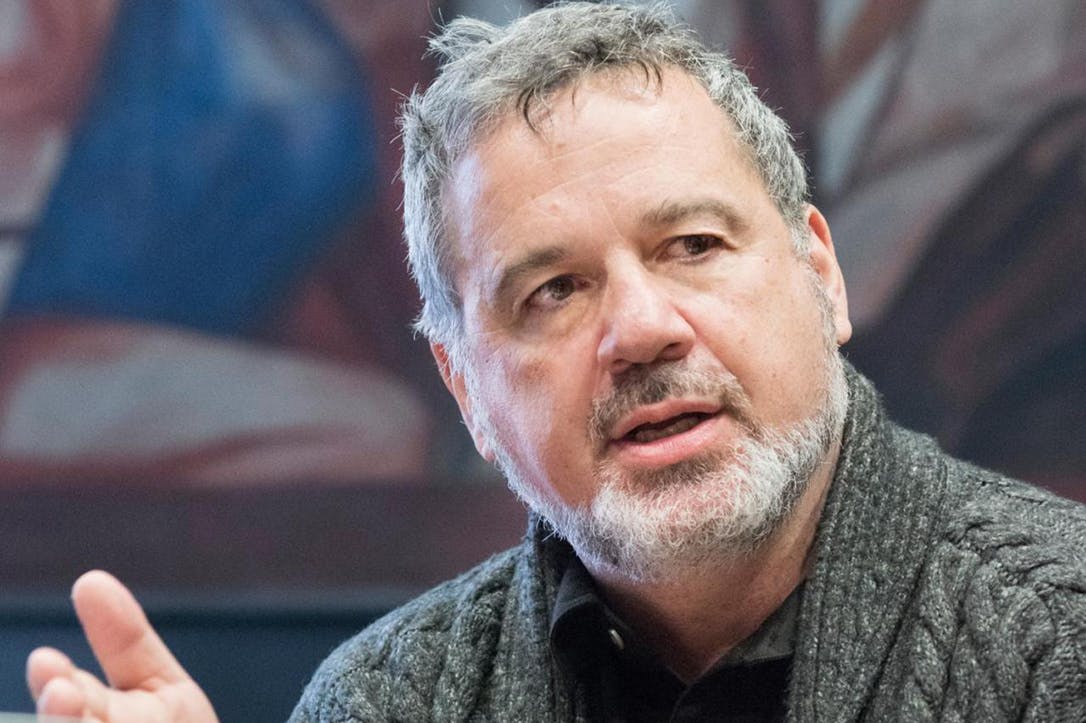
This profile originally appeared on Research Matters.
In the months leading up to the 2016 U.S. presidential election, New School for Social Research professor of history Oz Frankel proposed a new course named simply Trump as History. It has quickly become one of the department’s most popular courses among undergraduates at Eugene Lang College of Liberal Arts. Research Matters spoke with Professor Frankel about how he developed the class amid one of the most shocking electoral upsets in history.
“I was convinced it would never happen,” said Frankel, reflecting on the unexpected victory, “and [Donald] Trump would be consigned to history.” Hence the history course. Needless to say, things turned out differently. But while its initial framework had to change, the course took on a new purpose and significance.
The contemporaneous nature of the subject presents interesting challenges for a historian. “The problem is that Trump is a current event; he is a work-in-progress,” explained Frankel. This gives rise to a crucial methodological question: Perhaps it’s too early to historicize him? Instead, Frankel harnesses that very lack of historical perspective to demonstrate to students the value of thinking historically.
“I actually make the argument that the media is already thinking of Trump historically, but perhaps in the wrong ways,” Frankel said. The most popular of those ways is drawing historical analogies. “Trump is like … insert your preferred historical figure here. There are continual attempts to find some historical precedent, from Richard Nixon to Pat Buchanan to PT Barnum,” he explained. “There was also a drive to dig up — especially before the election — prophecies from the past that somehow predicted the rise of Trump, like Philip Roth’s 2004 novel The Plot Against America, Richard Rorty’s 1998 book Achieving Our Country, or that Carl Sagan quote.”
Frankel sees these approaches as symptoms of a state of crisis and public bewilderment that pushes society to look to the past in order to grapple with the present. However, these efforts rely on a narrow conception of history and miss the important structural and historical roots of Trumpism. “Analogies are accessible, but they often reduce history to a succession of personalities. I address these popular comparisons with my students, and we discuss why they constitute problematic ways to engage the past.”
In other words, bigger questions of how we think about history today, and what kind of historical consciousness is cultivated among the public, guide the course. These questions concern popular perceptions of history as well as “the kind of historical imagination propelling people like [Steve] Bannon or Stephen Miller” and “the influence in these two cases of [early-20th-century German philosopher Oswald] Spengler, with his organic and cyclical conception of history. It’s a very pessimistic, reactionary view.”
Frankel encourages his students to move past Trump as an individual and to think of Trumpism as a historical and political phenomenon. “Trump is a tool for thinking about patterns of American history we didn’t pay much attention to in the early part of the 21st century.” Specifically, Frankel guides students to narrow in on “the history of American populism; of racism, anti-immigrant sentiment, and its historicity; issues of masculinity, politics, and spectacle; as well as the subject position of the businessman as a cultural hero. We also have the history of ‘fake news.’” Weaving these historical threads together allows the students to map “what was in the DNA of American democracy that was conducive to something like Trumpism.”
Drawing on a variety of sources, including journalistic articles, academic publications, films, and blogs, Frankel leads students through an exploration of each of the key themes that contribute to Trumpism, such as populism. “During the election, Bernie [Sanders] and Trump were both being labeled as populists,” Frankel recalled. “In class, we explore the long historical arch of populism in U.S. history, which brings us to late 20th century, the Tea Party, current reflections on the idea of the white working class, and the question of why people are ostensibly voting against their material interests.” Another theme is racial dynamics, especially the often ever-defensive identities congealing around whiteness. Frankel commented, “Why do whites feel threatened? Whiteness is usually ‘transparent,’ but when whites feel threatened, then they become white. There is a long thread of paranoia and fear in American history.”
Related concerns about social and cultural decline cross political divisions. Frankel assigns his students George Packer’s The Unwinding (2013), which weaves together short biographies that document familiar themes of de-industrialization, the demise of institutions, the unraveling of the American social fabric, and the ascendance of “organized money.” While the book’s thesis comes from the political Left, it also overlaps with Bannon’s bleak view of the trajectory of American history, encouraging students to think beyond entrenched political distinctions.
In addition to considering historical continuities, Frankel encourages his student to think about what is new and unprecedented about the Trump moment in American political life. While Trump’s seemingly improbable political victories throughout 2016 could be cast as a series of flukes that might have ended very differently, they also show us the importance of accidents and of individual agency in history. “Trump certainly has the capacity of creating a new political reality; he already took over the Republican Party and introduced new dynamics into the American public sphere.”
Trump is titillating, and students — many of whom were not necessarily interested in history before — are eager to grapple with these issues, including their own role in the current political moment. Frankel insists upon it, remarking, “I ask students to reflect on our complicity in the Trump phenomenon, the near-addiction that we have all developed to Trump, something that’s become so ingrained in our daily existence” — and, for many, the very reason they signed up for the class.